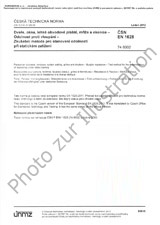Wir benötigen Ihre Einwilligung zur Verwendung der einzelnen Daten, damit Sie unter anderem Informationen zu Ihren Interessen einsehen können. Klicken Sie auf "OK", um Ihre Zustimmung zu erteilen.
ČSN EN ISO 20765-2 (385511)
Natural gas - Calculation of thermodynamic properties - Part 2: Single-phase properties (gas, liquid, and dense fluid) for extended ranges of application
Name übersetzen
NORM herausgegeben am 1.4.2019
Informationen über die Norm:
Bezeichnung normen: ČSN EN ISO 20765-2
Zeichen: 385511
Katalog-Nummer: 506641
Ausgabedatum normen: 1.4.2019
SKU: NS-945021
Zahl der Seiten: 76
Gewicht ca.: 228 g (0.50 Pfund)
Land: Tschechische technische Norm
Kategorie: Technische Normen ČSN
Kategorie - ähnliche Normen:
Die Annotation des Normtextes ČSN EN ISO 20765-2 (385511):
This part of ISO 20765 specifies a method to calculate volumetric and caloric properties of natural gases, manufactured fuel gases, and similar mixtures, at conditions where the mixture may be in either the homogeneous (single-phase) gas state, the homogeneous liquid state, or the homogeneous supercritical (dense-fluid) state.
NOTE 1 - Although the primary application of this document is to natural gases, manufactured fuel gases, and similar mixtures, the method presented is also applicable with high accuracy (i.e., to within experimental uncertainty) to each of the (pure) natural gas components and to numerous binary and multi-component mixtures related to or not related to natural gas.
For mixtures in the gas phase and for both volumetric properties (compression factor and density) and caloric properties (for example, enthalpy, heat capacity, Joule-Thomson coefficient, and speed of sound), the method is at least equal in accuracy to the method described in Part 1 of this International Standard, over the full ranges of pressure p, temperature T, and composition to which Part 1 applies. In some regions, the performance is significantly better; for example, in the temperature range 250 K to 275 K (-10 °F to 35 °F). The method described here maintains an uncertainty of ± 0,1 % for volumetric properties, and generally within 0,1 % for speed of sound. It accurately describes volumetric and caloric properties of homogeneous gas, liquid, and supercritical fluids as well as those in vapour-liquid equilibrium. Therefore its structure is more complex than that in Part 1.
NOTE 2 - All uncertainties in this document are expanded uncertainties given for a 95 % confidence level (coverage factor k = 2).
The method described here is also applicable with no increase in uncertainty to wider ranges of temperature, pressure, and composition for which the method of Part 1 is not applicable. For example, it is applicable to natural gases with lower content of methane (down to 0,30 mole fraction), higher content of nitrogen (up to 0,55 mole fraction), carbon dioxide (up to 0,30 mole fraction), ethane (up to 0,25 mole fraction), and propane (up to 0,14 mole fraction), and to hydrogen-rich natural gases. A practical usage is the calculation of properties of highly concentrated CO2 mixtures found in carbon dioxide sequestration applications.
The mixture model presented here is valid by design over the entire fluid region. In the liquid and dense-fluid regions the paucity of high quality test data does not in general allow definitive statements of uncertainty for all sorts of multi-component natural gas mixtures. For saturated liquid densities of LNG-type fluids in the temperature range from 100 K to 140 K (-280 °F to -208 °F), the uncertainty is ±(0,1 - 0,3) %, which is in agreement with the estimated experimental uncertainty of available test data.
The model represents experimental data for compressed liquid densities of various binary mixtures to within ±(0,1 - 0,2) % at pressures up to 40 MPa (5800 psia), which is also in agreement with the estimated experimental uncertainty. Due to the high accuracy of the equations developed for the binary subsystems, the mixture model can predict the thermodynamic properties for the liquid and dense-fluid regions with the best accuracy presently possible for multi-component natural gas fluids
Normansicht ČSN EN ISO 20765-2 (385511)
Empfehlungen:
Aktualisierung der Gesetze
Wollen Sie sich sicher sein, dass Sie nur die gültigen technischen Vorschriften verwenden?
Wir bieten Ihnen Lösungen, damit Sie immer nur die gültigen (aktuellen) legislativen Vorschriften verwenden könnten.
Brauchen Sie mehr Informationen? Sehen Sie sich diese Seite an.




 Cookies
Cookies
